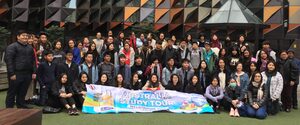The Benefits of Participating in a Study Tour for Students
Body
Introduction
Study tours, also known as educational tours or field trips, are valuable experiences that offer students the opportunity to learn outside the confines of a classroom. These tours involve traveling to different locations, exploring historical sites, museums, industries, and interacting with local communities. Study tours provide students with a hands-on learning experience that complements traditional classroom education. In this guide, we will explore the numerous benefits of participating in a study tour for students and how these experiences can enhance their education through experiential learning.
- Cultural Immersion and Global Awareness
One of the most significant advantages of study tours is the exposure to diverse cultures and traditions. Students have the chance to immerse themselves in different lifestyles, languages, and customs, fostering a sense of global awareness and cultural appreciation. This exposure helps students develop tolerance, understanding, and respect for people from different backgrounds, preparing them for an increasingly interconnected world.
- Enhanced Learning Opportunities
Study tours provide hands-on learning experiences that are often not possible within the classroom setting. Visiting historical landmarks, scientific institutions, or cultural sites allows students to see and touch what they have only read about in textbooks. This tangible experience enhances their understanding of various subjects, making learning more engaging and memorable.
- Improved Social and Communication Skills
Participating in a study tour encourages students to interact with their peers, teachers, tour guides, and locals. These interactions promote the development of social and communication skills, including teamwork, active listening, and effective communication. Students learn to collaborate with others, share ideas, and work together to solve problems, enhancing their interpersonal abilities.
- Real-World Application of Knowledge
Study tours bridge the gap between theoretical knowledge acquired in the classroom and its real-world application. Students can witness how concepts and theories are put into practice in various fields such as science, technology, engineering, arts, and mathematics (STEAM). This exposure helps students connect the dots between academic learning and real-life scenarios, making their education more meaningful and relevant.
- Boosted Confidence and Independence
Traveling and exploring new environments during study tours can significantly boost students' confidence and independence. Navigating unfamiliar places, interacting with locals, and adapting to different cultures require students to step out of their comfort zones. Overcoming these challenges enhances their self-esteem and self-reliance, preparing them for future academic and personal endeavors.
- Cultivation of Curiosity and Critical Thinking
Study tours often involve guided tours, workshops, and interactive sessions that encourage students to ask questions and engage in discussions. This cultivation of curiosity stimulates critical thinking skills as students analyze information, form opinions, and evaluate different perspectives. Encouraging curiosity and critical thinking fosters a lifelong love for learning and prepares students to become informed and analytical thinkers.
- Career Exploration and Networking Opportunities
For older students, study tours provide valuable insights into potential career paths. Visiting industries, research centers, or vocational training facilities allows students to explore different professions and gain firsthand knowledge about specific fields. Additionally, study tours often involve interactions with professionals, experts, and mentors, providing students with networking opportunities that can be beneficial for their future careers.
- Civic and Environmental Awareness
Study tours focused on civic engagement and environmental conservation allow students to understand the importance of responsible citizenship and environmental stewardship. Visiting community service organizations, environmental conservation sites, or sustainable agriculture projects raises awareness about social issues and environmental challenges. Students learn the significance of contributing positively to their communities and the environment.
- Cultivation of Empathy and Compassion
Exposure to different cultures, social issues, and challenges faced by various communities during study tours cultivates empathy and compassion among students. Witnessing firsthand the struggles and triumphs of others fosters a sense of empathy, encouraging students to become compassionate and socially responsible individuals. This emotional intelligence is a crucial aspect of holistic education.
- Memorable and Lifelong Learning Experiences
Finally, study tours create lasting memories and lifelong learning experiences. The unique and enriching experiences gained during these tours stay with students for a lifetime. Students often reminisce about the places they visited, the people they met, and the knowledge they acquired, making study tours a significant and cherished part of their educational journey.
Conclusion
Participating in a study tour is a transformative experience that enriches students' education in numerous ways. From cultural immersion and enhanced learning opportunities to improved social skills and career exploration, study tours offer a wide range of benefits. These experiences not only broaden students' horizons but also shape them into well-rounded individuals equipped with essential life skills, empathy, and a global perspective. As educational institutions continue to recognize the value of experiential learning, study tours play a vital role in shaping the future leaders and global citizens of tomorrow.
Source URL : https://sites.google.com/site/bestessaywritingservicereview/







Comments